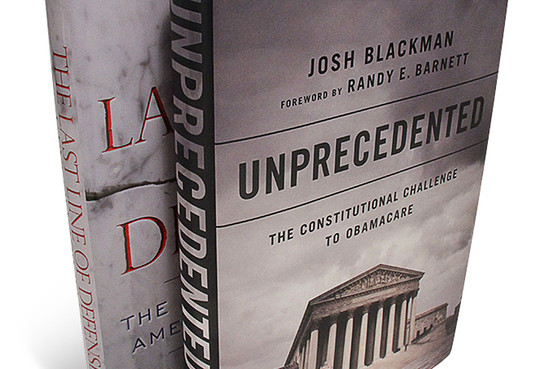 Today the Wall Street Journal reviewed Unprecedented, along with Virginia Attorney General Ken Cuccinelli’s new book, the Last Line of Defense, as part of a discussion of the role of the states in combatting the sprawling federal government. The Journal said the two were “excellent books.”
Today the Wall Street Journal reviewed Unprecedented, along with Virginia Attorney General Ken Cuccinelli’s new book, the Last Line of Defense, as part of a discussion of the role of the states in combatting the sprawling federal government. The Journal said the two were “excellent books.”
Here is a flavor:
Republican governors and attorneys general have become the most effective opponents of Obamacare and federal overreach in general. Two excellent books, one published earlier this year and the other just out, give detailed accounts of the states’ fight to defeat Obamacare and preserve the Constitution’s limits on federal power.
…
Both Virginia Attorney General Ken Cuccinelli, a key leader of the state fight, and South Texas College of Law professor Josh Blackman argue that the majority opinion written by Mr. Roberts was so finely balanced as to render the act ultimately unworkable.
Plus a mention of Randy’s work for NFIB:
Georgetown professor Randy Barnett, whose Jones Day team of lawyers represented the National Federation of Independent Business in its lawsuit, argues in the foreword to the Blackman book that the Roberts rulings against the coercion of the states and the original claims for the mandate—before it was redefined as a tax—were in fact big victories for the Constitution’s doctrine of limited federal powers.
Cross-Posted at Volokh.com.
Update: Here is the review:
Republican governors and attorneys general have become the most effective opponents of Obamacare and federal overreach in general. George Melloan reviews Josh Blackman’s “Unprecedented” and Ken Cuccinelli’s “The Last Line of Defense.”
Since the 2008 financial crisis and the capture that year of both the White House and Congress by the progressive wing of the Democratic Party, Americans have experienced a remarkable expansion of federal power—and have reacted to it with less than full enthusiasm.
Take the Patient Protection and Affordable Care Act (ACA), bludgeoned into law by President Barack Obama, House Speaker Nancy Pelosi and Senate Majority Leader Harry Reid in 2010. This long and complex act was in trouble from the moment Mr. Obama signed it, provoking a wave of lawsuits challenging its constitutionality. The Tea Party movement sprang up to protest a further federal intrusion into a deeply personal service, medical treatment. Democrats took a heavy beating in the 2010 midterm elections, losing the House and the balance of power in the nation’s statehouses.
The statehouse losses were shrugged off by egocentric Washington, but they represent a dramatic change in American politics. Republican governors and attorneys general have become the most effective opponents of Obamacare and federal overreach in general. Two excellent books, one published earlier this year and the other just out, give detailed accounts of the states’ fight to defeat Obamacare and preserve the Constitution’s limits on federal power.
The progressives claimed a major victory when Chief Justice John Roberts, supported by four liberal justices, upheld the ACA in June of last year. But that isn’t quite the way these authors see it. Both Virginia Attorney General Ken Cuccinelli, a key leader of the state fight, and South Texas College of Law professor Josh Blackman argue that the majority opinion written by Mr. Roberts was so finely balanced as to render the act ultimately unworkable.
The chief justice had to employ the high court’s seldom-used “saving power” to rewrite the statute to make it constitutional. At issue was the “personal mandate” requiring individuals to buy health insurance or pay a penalty. The chief justice wrote that the government can’t compel the purchase of health insurance, thus rejecting the act’s “free rider” solution—the component that is necessary for financial soundness. But he held that an alternative tax would be constitutional so long as it was low enough to be a viable alternative to insurance premiums. So he called the act’s penalty for noncompliance, which is in fact low relative to the cost of insurance, a “tax” and waved the ACA through.
Obamacare also calls for an expansion of Medicaid, administered by the states, to sweep up some of the uninsured. But the court ruled that the feds couldn’t coerce a state to expand Medicaid by threatening to cut off all federal support for the state’s program. Georgetown professor Randy Barnett, whose Jones Day team of lawyers represented the National Federation of Independent Business in its lawsuit, argues in the foreword to the Blackman book that the Roberts rulings against the coercion of the states and the original claims for the mandate—before it was redefined as a tax—were in fact big victories for the Constitution’s doctrine of limited federal powers. Mr. Blackman himself, after taking us through the story of the ACA’s passage and its trip through the courts, concurs in that view. He also argues that the chief justice acted as he did because of his reluctance to strike down a democratically enacted law in its entirety.
Other inherent defects of the ACA, such as the administrative nightmare that forced the government to waive the vetting of entrants to subsidized insurance pools, are already on display. Because of bureaucratic snafus, Mr. Obama has been forced to grant employers a one-year extension of the enrollment deadline.
Mr. Blackman titled his book “Unprecedented” because of Obamacare’s many disturbing “firsts.” One was the passage of a major bill with no “aye” votes from the opposition (the Republicans). Another was the union of 26 states to fight a federal law through the courts. Still another was the Supreme Court’s decision itself, which “upheld a law never enacted but did so in such a way as to render it largely ineffective.”
The progressives have joined battle with the states. Mr. Blackman observes that “nearly all” the state attorneys general who have sought higher office since the Obamacare fight have been defeated. Mr. Cuccinelli is himself locked in a tight race for Virginia’s governorship with a stalwart of the Clinton political machine, Terry McAuliffe.
In “The Last Line of Defense,” Mr. Cuccinelli chronicles how the 26 states came together to fight Obamacare and pointedly argues that the states must continue to resist Washington’s flouting of the Constitution. He goes beyond the ACA to attack constitutional abuses by other arms of the federal government, such as the Environmental Protection Agency and the National Labor Relations Board, offering something of a Tea Party handbook.
Obamacare still faces court challenges, not least to its contraception mandate, which plaintiffs claim to be a violation of religious freedom. As to the states, it has become harder for a financially squeezed federal government to buy them off with the grants that accompany federal mandates. A new cadre of statehouse Republicans are finding in Obamacare a crisis too good to waste.
